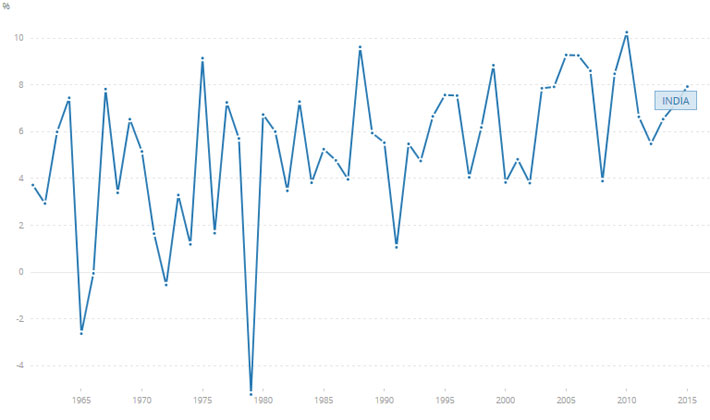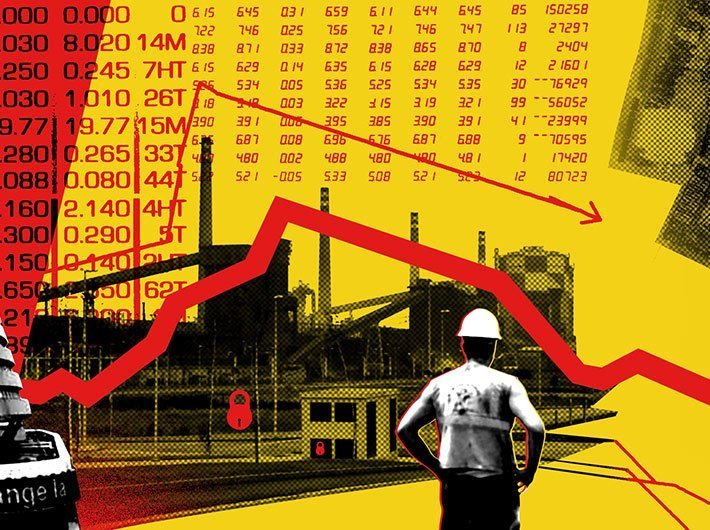A gasping economy means bad politics for the Bharatiya Janata Party that is hoping to recreate the 2014 magic when it won the parliamentary election with a brute majority.
Demonetisation has dented the economy and the latest data is quite grim. India is no longer the world’s fastest growing economy, a fact that BJP leaders had been going to town about. The new figures are bound to take the wind out of their sails.
In the third year of the Narendra Modi government, the economy is now down to 7.1 percent, with the Q4 post-demonetisation figure a disheartening 6.1 percent. Three years of higher spending by the government has not yielded the desired result.
In defence, finance minister Arun Jaitley on Thursday said demonetisation was not the reason behind the shocking fall in the growth rate. He even said signs of slowdown were visible even before the November 8 move, though he did not elaborate.
Things were frankly quite better during the of the UPA tenure, when economist-turned-politician Manmohan Singh was at the helm of affairs.
“Average GDP growth rate during the period of UPA government (2004-05 to 2013-14) has been 7.7 percent despite two global slowdown in this period,” said the report card titled ‘10 Years of Progress and Growth’ which in January 2014 highlighted the achievements of the government led by Singh.
Months later, the UPA lost the elections and the BJP-led NDA came to power.
The GDP growth rate at constant prices (i.e., at the price level of the base year 2004-05) has been fluctuating during the period 2001-02 to 2013-14. The fluctuations range from 3.84% in the year 2002-03 to 9.57% in 2006-07.
The GDP growth rate decreased from 5.81% in 2001-02 to 3.84% in 2002-03. Thereafter, GDP growth rate increased and reached a high growth trajectory of 9% plus growth. India experienced three consecutive years of GDP growth rate in excess of 9% viz. 9.48% in 2005-06, 9.57% in 2006-07 and 9.32% in 2007-08, said community.data.gov.in.
India's GDP growth (annual %) by World Bank

The GDP growth rate declined to 6.72% in 2008-09 largely due to global financial meltdown following the collapse of the investment bank Lehman Brothers of the US in September 2008. The growth rate improved to 8.59% in 2009-10 and 8.91% in 2010-11 due to high capital inflows attributed to the massive Quantitative Easing (QE) undertaken by the US to combat economic slowdown of global level.
The GDP growth rate slumped to 6.69% in 2011-12, 4.47% in 2012-13 and 4.74% in 2013-14 (P). This was due largely to domestic policy logjam, tax disputes and shaken investor confidence in Indian economy.
“GDP at constant (2011-12) prices in Q4 of 2016-17 is estimated at Rs 32.28 lakh crore, as against Rs 30.42 lakh crore in Q4 of 2015-16, showing a growth rate of 6.1 percent. GVA (Gross Value Added) at basic prices at constant (2011-12) prices in Q4 of 2016-17 is estimated at Rs 28.69 lakhcrore, as against Rs 27.18 lakh crore in Q4 of 2015-16, showing a growth rate of 5.6 percent,” said the
Central Statistics Office
It added: “Real GDP or GDP at constant (2011-12) prices for the year 2016-17 is estimated at Rs 121.90 lakh crore showing a growth rate of 7.1 percent over the year 2015-16 of Rs 113.81 lakh crore.”
Last year, the International Monetary Fund (IMF) too had cut its prediction for growth in India’s GDP by 0.2 percentage point to 7.3% for the year ending March 31, 2016.
The latest growth rate of 6.1 percent means that the country is staring at bleak days ahead. It is also an I-told-you-so moment as former PM Manmohan Singh had warned about it following demonetisation.
“GDP can decline by 2 percent – and this is an underestimate, not overestimate,” Manmohan Singh had warned in parliament on November 24, 2016. He had described demonetisation as “a monumental management failure” and added: “It is nothing less than organised loot and legalized plunder.”
The World Bank’s latest report too must be quite discouraging for the BJP. It noted that despite renewed weakness in private investment and limited lift from external demand, India was poised to continue growing robustly in FY17 until “demonetization” dented growth, albeit moderately, causing immediate cash crunch, and affecting activity in cash reliant sectors. The cash crunch affected activity in cash reliant sectors and GDP growth slowed to 7.0 percent y/y during Q3 FY17, from 7.3 percent during H1 FY17.
Capital expenditure by the central government has increased from 2.6 percent of GDP in FY15 to 2.8 percent in FY16 and 3.0 percent in FY17. Reflecting this increase, as well as higher spending by state governments, public investment by the general government in the national accounts has increased from 3.5 percent of GDP in FY15 to 3.9 percent of GDP in FY16, said
World Bank’s India Update 2017.
